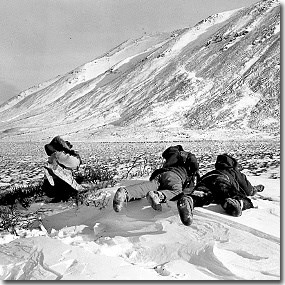
Helge Ingstad photo “Caribou meat is our meat since I was born. I was raised with it. The skin was my clothes. The meat was my diet and the broth was my drink… Without caribou meat, what would I eat...?” Rachel Riley, Nunamiut Elder In Northern Alaska, people and caribou have lived in a close, intricate relationship for at least 11,000 years. Caribou have been vitally important for the survival of all native people whose homelands are now partially encompassed by Gates of the Arctic National Park and Preserve—or inland Iñupiat of Anaktuvuk Pass, Iñupiat people of the Kobuk and Noatak Rivers, and Koyukon Athabascans. For some tribes, caribou is just part of a diet which also includes other game, fish and marine mammals. But for inland mountain people—the Nunamiut Iñupiat—tuttu (caribou) is by far the single most important food source. Since a time immemorial, Nunamiut people have eaten meat, fat, and many other parts of the caribou and have sipped broth made from caribou meat and bones. Caribou skin clothing—parkas, pants, boots, socks and mittens—has protected them from the arctic cold. They have slept under caribou skin blankets and have sheltered in caribou skin tents. Caribou hides have also provided rawhide line for making snowshoes and sleds. And sinew from caribou tendons, in single or braided strands, have been used to make nets to catch ptarmigan and fish, as lashing for hunting tools, and as a strong and durable thread. 
Photo Courtesy of the Anchorage Museum of History and Art For Nunamiut people, the importance of caribou extends far beyond the material realm. This animal is at the foundation of their history; it pervades their daily life; and it is a symbol of their unique inland culture. Caribou hunting is pursued with passion and pride, as an endeavor requiring great skill, and it is underlain by deeply held spiritual beliefs. Today, as in the past, caribou symbolize what it means to be Nunamiut. In historic times, reliance on migratory caribou herds dictated a nomadic lifestyle. It also made the stories and teachings passed down through generations crucial for success in hunting and for survival in the challenging arctic environment. Beginning in childhood, Nunamiut people acquired a sophisticated knowledge of caribou behavior and ecology, they learned every detail of the landscape, and they came to understand the vagaries of arctic weather. They also devised a complex array of hunting methods, such as the construction of human-like stone figures (iñuksuit) to help direct or funnel caribou over many miles into corrals, lakes or rivers where hunters waited with spears or bows and arrows. 
Photo Courtesy of the Anchorage Museum of History and Art, Ward W. Wells Collection. Modern life has changed from earlier times, when Nunamiut Iñupiat moved their encampments from place to place to intercept caribou migrations. Since the 1950s, they have lived in the village of Anaktuvuk Pass, which is on a major migratory pathway. However, an intimate knowledge of caribou is still essential for Nunamiut hunters, who travel widely by snow machine and hunt with rifles, either alone or in small groups. The people continue to wear beautiful caribou skin boots, socks, and mittens, and they sleep on caribou hide mattresses in camps. They have created a new art form—the caribou skin mask—which provides an income for some village families. And most importantly, caribou meat and fat are still essential as staple foods for today’s villagers. The connection between caribou and people continues to remain unbroken. Caribou and People | Caribou Skin Clothing | Caribou Skin Tents | Caribou Skin Tents (continued) | The Caribou Drive | Back to History and Culture |
Last updated: April 6, 2023
